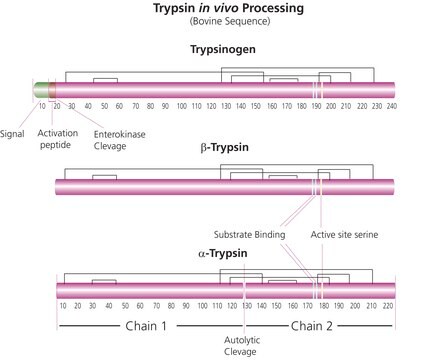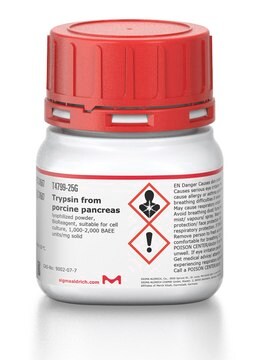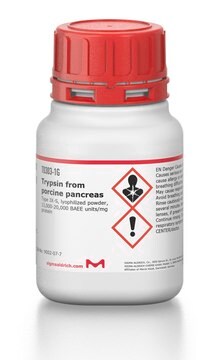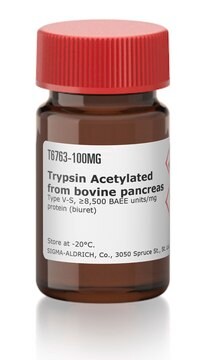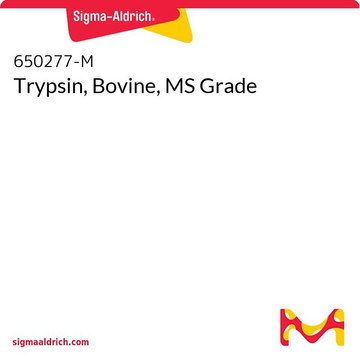4370285
Trypsin, TPCK-Treated
Sinónimos:
Trypsin, TPCK treated for Cell Culture
Iniciar sesiónpara Ver la Fijación de precios por contrato y de la organización
About This Item
Productos recomendados
shipped in
dry ice
storage temp.
−20°C
Categorías relacionadas
General description
Trypsin is a serine protease that specifically hydrolyzes peptide bonds at the carboxyl side of lysine and arginine residues. This modified trypsin has been treated with N-tosyl-L-phenylalanine chloromethyl ketone (TPCK) to inactivate extraneous chymotryptic activity. Each package contains 8 vials, with 25 μg in each vial.
Application
Trypsin, TPCK-Treated has been used:
- as a supplement in Dulbecco′s Modified Eagle Medium (DMEM) for porcine delta coronavirus (PDCoV) infection experiments using epithelial-like pig kidney cell line (LLC-PK1)
- to detach the human umbilical vein endothelial cells (HUVEC) for annexin-V/propidium Iodide (PI) staining assay
- in minimum essential medium (MEM) for multicycle replication kinetics
Biochem/physiol Actions
N-p-Tosyl-L-phenylalanine chloromethyl ketone (TPCK) serves as an irreversible inhibitor of chymotrypsin. Trypsin induces human fibrocyte differentiation. Trypsin is widely used in proteomics for protein sample digestion. In cell culture, trypsinization is carried out to dislodge adherent cells from each other and the walls of the culture vessel.
signalword
Danger
hcodes
Hazard Classifications
Eye Irrit. 2 - Resp. Sens. 1 - Skin Irrit. 2 - STOT SE 3
target_organs
Respiratory system
Storage Class
10 - Combustible liquids
flash_point_f
Not applicable
flash_point_c
Not applicable
Certificados de análisis (COA)
Busque Certificados de análisis (COA) introduciendo el número de lote del producto. Los números de lote se encuentran en la etiqueta del producto después de las palabras «Lot» o «Batch»
¿Ya tiene este producto?
Encuentre la documentación para los productos que ha comprado recientemente en la Biblioteca de documentos.
Los clientes también vieron
Zdeněk Perutka et al.
Molecules (Basel, Switzerland), 23(10) (2018-10-17)
Trypsin is the protease of choice for protein sample digestion in proteomics. The most typical active forms are the single-chain β-trypsin and the two-chain α-trypsin, which is produced by a limited autolysis of β-trypsin. An additional intra-chain split leads to
Jian-Ping Dai et al.
International journal of molecular sciences, 19(4) (2018-03-24)
Oxymatrine (OMT) is a strong immunosuppressive agent that has been used in the clinic for many years. In the present study, by using plaque inhibition, luciferase reporter plasmids, qRT-PCR, western blotting, and ELISA assays, we have investigated the effect and
Wentao Li et al.
Proceedings of the National Academy of Sciences of the United States of America, 115(22), E5135-E5143 (2018-05-16)
Porcine deltacoronavirus (PDCoV), identified in 2012, is a common enteropathogen of swine with worldwide distribution. The source and evolutionary history of this virus is, however, unknown. PDCoV belongs to the Deltacoronavirus genus that comprises predominantly avian CoV. Phylogenetic analysis suggests
Yu Bai et al.
Microbial pathogenesis, 150, 104645-104645 (2020-12-08)
Influenza virus is responsible for significant morbidity and mortality worldwide. Acute lung injury (ALI)/acute respiratory distress syndrome (ARDS) is the major cause of death in influenza virus infected patients. Recent studies indicated that active glucagon like peptide-1 (GLP-1) encoded by
Nuestro equipo de científicos tiene experiencia en todas las áreas de investigación: Ciencias de la vida, Ciencia de los materiales, Síntesis química, Cromatografía, Analítica y muchas otras.
Póngase en contacto con el Servicio técnico